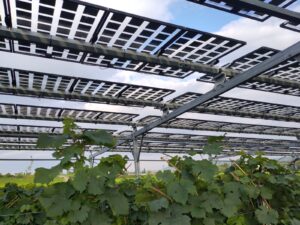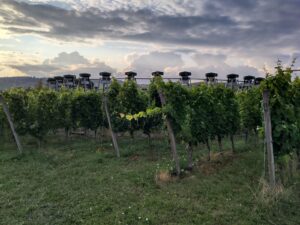The global research community dedicated to viticulture (grape growing) and enology (winemaking) recently convened at Geisenheim University, one of Germany’s most prestigious institutions for wine science. The 23rd international GiESCO conference was held between July 27-31 under the motto ”Above and Below – Towards the Future,” with a focus on the future of wine production and sustainability in light of environmental and climatic challenges. For us Swedes, who are seeing a growing interest in viticulture, the conference provided an important insight into global efforts to secure the future of wine.
 I had the privilege of attending the conference as an employee of the University of Tokaj in Hungary, alongside my colleague Dr. Barnabás Kovács, a researcher and expert in soil biology and a natural wine producer (BioVitis Pince). We were there to present a scientific poster titled ”The effect on soil water-holding capacity of a new soil aeration method on biodynamic, integrated and organic vineyards” (Kovács et al. 2025). The poster showcased results from a wine farm trial in Hungary, demonstrating techniques to increase soil water availability based on data from organic, biodynamic, and integrated vineyards. Our presentation was part of a broader discussion on the crucial topic of soil and water management, one of the key themes of the conference
I had the privilege of attending the conference as an employee of the University of Tokaj in Hungary, alongside my colleague Dr. Barnabás Kovács, a researcher and expert in soil biology and a natural wine producer (BioVitis Pince). We were there to present a scientific poster titled ”The effect on soil water-holding capacity of a new soil aeration method on biodynamic, integrated and organic vineyards” (Kovács et al. 2025). The poster showcased results from a wine farm trial in Hungary, demonstrating techniques to increase soil water availability based on data from organic, biodynamic, and integrated vineyards. Our presentation was part of a broader discussion on the crucial topic of soil and water management, one of the key themes of the conference
The conference also featured sessions dedicated to topics such as sustainable and organic practices, biodiversity, and the physiological responses of grapevines to stress. Other areas of focus included advancements in grape variety and rootstock breeding, the integration of digitization and robotics, and data-driven viticulture. Prominent speakers included Professor Cornelis (Kees) van Leeuwen of Bordeaux Sciences Agro, renowned for his research on terroir; Markus Keller, a distinguished professor at Washington State University and author of The Science of Grapevines; and Ilona Leyer, a professor of biodiversity at Geisenheim University, to name a few.
The academic sessions were complemented by hands-on experiences. Attendees had the opportunity to tour the HGU Experimental Facility, which provided a firsthand look at cutting-edge research in action. The conference also featured a special ”Professional Day” and excursions to local wineries in the Rheingau Valley. These industry tours created a vital bridge between research and practical viticulture, allowing participants to see theoretical findings put into practice and network with regional winemakers.
 GiESCO 2025 clearly showed that the wine world is deeply engaged in meeting the challenges of climate change. By focusing on everything from the soil’s microlife to the above-ground vine and the latest technology in the vineyard, the foundation was laid for a more sustainable and adaptable viticulture. For those of us who follow the development of wine in Sweden, this is an important reminder that knowledge and cooperation are crucial for building a future for wine, whether it is grown in the Rheingau in Germany, Tokaj in Hungary, or Skåne in Sweden.
GiESCO 2025 clearly showed that the wine world is deeply engaged in meeting the challenges of climate change. By focusing on everything from the soil’s microlife to the above-ground vine and the latest technology in the vineyard, the foundation was laid for a more sustainable and adaptable viticulture. For those of us who follow the development of wine in Sweden, this is an important reminder that knowledge and cooperation are crucial for building a future for wine, whether it is grown in the Rheingau in Germany, Tokaj in Hungary, or Skåne in Sweden.
Text: Karl-Johan Fabó
Horticulturalist; Consultant and Freelance Writer (Jord & Kultur); Research Assistant, University of Tokaj
